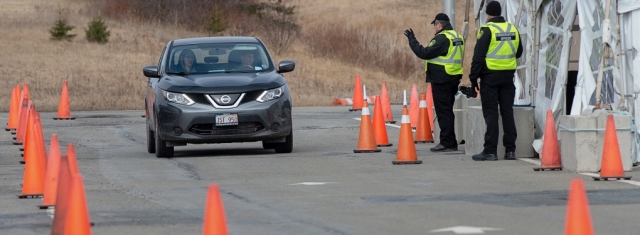Travel
Atlantic Bubble On Hold
Due To Spike in COVID-19 Cases

Nova Scotia/New Brunswick Border (Source: Stock Photo)
USPA NEWS -
The Premiers of Canada's four Atlantic provinces announced on Thursday March 18th, that as of April 19, 2021, residents of Nova Scotia, New Brunswick, Prince Edward Island, and Newfoundland will be able to travel freely within the provinces without restrictions. However, due to a sudden surge of COVID-19 cases in Nove Scotia and New Brunswick, the Atlantic Bubble has been put on hold for at least the next 30 days as most cases have been linked to travel.
At the Tuesday April 20th COVID-19 media briefing, Dr Robert Strang chief medical officer of health for the Province of Nova Scotia said, "Given the impact these travel cases are having on Nova Scotia's epidemiology, we are taking a significant step to tighten our borders. This is a temporary measure that will be in effect for four weeks, but if we need to, we will extend this time and put further restrictions in place."
The new restrictions will take effect as of 8am on Thursday, April 22nd, 2021. This will mean that the Nova Scotia and New Brunswick border will be closed to all non-essential travel.
In the media release, Dr Robert Strang defined the following as essential travel: People who live in Nova Scotia but their primary employment is in another province, federally approved temporary foreign workers, people who need to participate in-person in a legal proceeding in another province, post-secondary students coming to study in Nova Scotia, post-secondary students returning to their primary or family residence in Nova Scotia and parents who accompany them, parents picking up a student in Nova Scotia to take them home as quickly as possible, people who can demonstrate that they already have a new permanent address in Nova Scotia as of April 21 and are moving here permanently, people traveling for child custody reasons following the child custody protocol, people who are exempt from self-isolation following the exempt traveler protocol, and people traveling between Nova Scotia and New Brunswick for work, school or children in child care, following conditions in the protocol for travel between these provinces."
Dr Strang went on to say, "To everyone else, we are saying do not travel to Nova Scotia at this time.If you come here and your travel is not essential, you will be turned away or required to isolate at your point of entry at your own expense."
Dr Strang added, "And if you are a permanent resident here in Nova Scotia, we're asking you do not travel outside of Nova Scotia unless it's absolutely essential. If you have travelled outside of Nova Scotia, you won't be denied entry upon return, but you will have to follow the quarantine requirements like anybody else."
Liability for this article lies with the author, who also holds the copyright. Editorial content from USPA may be quoted on other websites as long as the quote comprises no more than 5% of the entire text, is marked as such and the source is named (via hyperlink).






